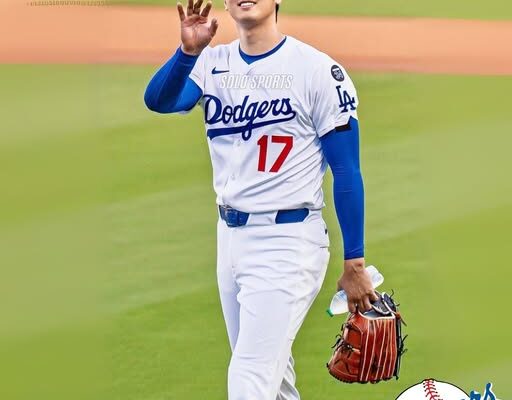In the vast landscape of professional sports, where the pursuit of excellence often leads to hyper-specialization, there emerges, every so often, an athlete who utterly defies conventional wisdom. And then, there is Shohei Ohtani. He isn’t merely exceptional; he is a force of nature, a living testament to what is possible when unparalleled skill meets audacious ambition. With each stroke of his bat and every pitch he unleashes, Ohtani compels the baseball world – and indeed, the wider sporting universe – to rethink the very essence of the game.
In a league that has increasingly rewarded players for mastering one facet of baseball, Ohtani made a conscious decision to do everything, and not only to do everything, but to do it better than almost anyone else in history. One day, he’s firing fastballs that clock in at nearly 100 mph, painting corners with precision and baffling hitters with an array of devastating off-speed pitches. The next, he’s stepping into the batter’s box, unleashing a swing that generates exit velocities seemingly from another planet, sending baseballs soaring into orbit for home runs that leave fans and commentators alike in stunned silence.
His athletic achievements are a continuous reel of groundbreaking milestones. In 2021, he became the first player in MLB history to be named an All-Star as both a pitcher and a position player, subsequently earning the unanimous American League MVP award for a season that was statistically unprecedented. He repeated this feat in 2023, once again winning the AL MVP unanimously, leading the league in home runs (44) while also securing 10 wins as a pitcher. Even in 2024, when he recovered from a second elbow injury and was limited to designated hitter duties for the Los Angeles Dodgers, Ohtani continued to rewrite the record books. He became the first player in MLB history to record a 50-home run and 50-stolen base season (finishing with 54 HR and 59 SB), leading the National League in several offensive categories and earning another unanimous MVP award, this time in the NL – making him the second player ever to win MVP in both leagues and the first full-time DH to win the NL MVP. He capped off 2024 by winning his first World Series with the Dodgers.
This dual-threat capability, famously dubbed “Shotime” and leading to comparisons with baseball’s legendary Babe Ruth, transcends mere statistics. It’s a breathtaking display of raw, unadulterated athletic ability that harks back to a bygone era of baseball, yet executed with modern-day precision and power. It’s the ultimate fantasy for any baseball enthusiast come to life. The skill is undeniable, the discipline required to maintain such mastery on both sides of the ball is immense, and the sheer persistence in the face of unique challenges – including two Tommy John surgeries – weaves a moving narrative of dedication and resilience.
However, his profound impact extends far beyond his physical actions on the field. Shohei Ohtani’s method, his demeanor, and his presence are equally as important as his prodigious feats. He possesses an innate charisma that effortlessly captivates audiences, bridging cultural divides and transcending geographical boundaries. From the bustling streets of Tokyo to the sun-drenched stadiums of Los Angeles, his appeal is universal. This charisma isn’t manufactured; it radiates from an authentic place.
Fans and observers consistently note his serene smile, a calm and often joyful expression that belies the immense pressure under which he performs. This quiet confidence, combined with a genuine, almost disarming humility, makes him incredibly relatable and endearing. In a world of sports where self-promotion often reigns supreme, Ohtani offers a refreshing contrast. He lets his play do the talking, and his actions speak louder than any words ever could. He deflects praise, consistently credits his teammates, and carries himself with a quiet dignity that resonates deeply with fans across all demographics. This unassuming nature, paired with his explosive talent, creates a magnetic paradox that draws both strangers and those closest to him into his orbit.
Ohtani’s cultural footprint is massive. In Japan, he is a national hero, a symbol of pride and inspiration. His success in MLB has led to a historic boom in viewership in his home country, transforming game times into communal viewing experiences. His endorsements, ranging from green tea to luxury watches, adorn billboards and television screens across Japan. In the United States, he has become arguably the most marketable player in the sport, with his jersey consistently ranking among the top sellers and his presence drawing sellout crowds wherever the Dodgers play. He is a bridge between two passionate baseball cultures, expanding the global reach of the sport in an unprecedented way.
Despite the monumental contract he signed with the Los Angeles Dodgers – a record 10-year, $700 million deal that reset the landscape of professional sports contracts – Ohtani’s focus remains squarely on the game. The deferrals in his contract, structured to give the Dodgers financial flexibility to build a championship team, are another example of his team-first mentality and humility.
The “Unicorn,” as he has rightfully been dubbed, continues to break hearts – those of opposing teams and their fans – and records with every season. His story is far from complete, and as he navigates the prime of his career, recovering from his pitching injury and returning to two-way play, the baseball world will watch with bated breath, eager to witness the next chapter in the unfolding legend of Shohei Ohtani. He is not just playing baseball; he is reimagining it, one superhuman pitch and one otherworldly swing at a time.



